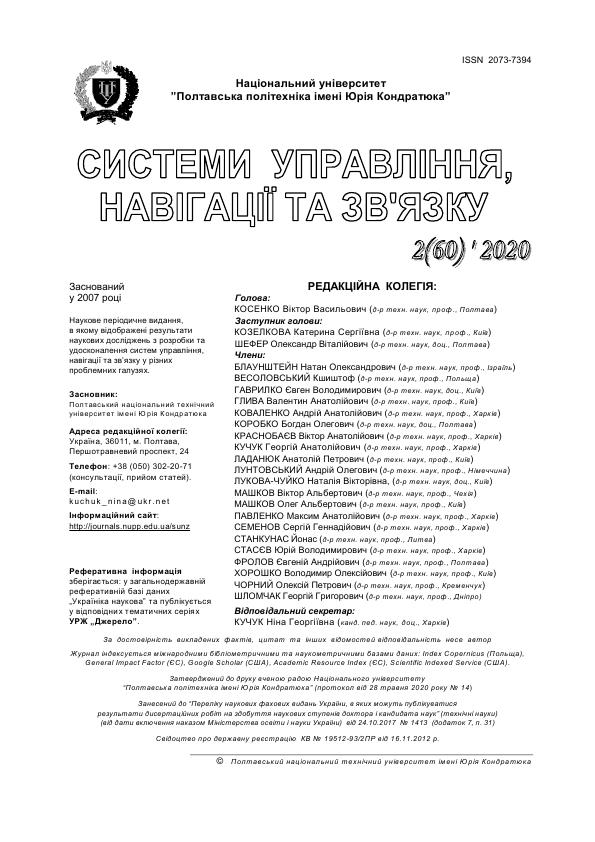AGENT BEHAVIOR ADAPTATION METHOD IN INTELLIGENT TRAINING MANAGER PREPARATION SYSTEM AIR TRAFFIC CONTROL
DOI:
https://doi.org/10.26906/SUNZ.2020.2.017Keywords:
agent, adaptation, air traffic control manager, intelligent learning system environment, multiagent systems, planning, self-tuning, fuzzy set theory, learning efficiencyAbstract
In the framework of the agent-based approach, in order to increase the variability of the training environment for air traffic control dispatchers, the article improves the method for adapting the behavior of the agents of the learning environment of an intelligent learning system based on knowledge of the results of agent interactions. At the stage of making changes to the parameters of the planning subsystem, when insisting on agent behavior modeling systems, it is proposed to use the selftuning mechanism. To manage the process of self-tuning the behavior of intelligent agents, the article developed a toolkit for adapting the agent behavior planning system. The use of agent behavior models with planning methods will increase the success rate for the implementation of the expected agent behavior in the construction of intelligent learning systems. The approach proposed in the article for adapting the behavior of the agents of the learning environment of the intellectual learning system will increase its variability. As a result, such an intelligent training system will bring to a new level the training of air traffic controllers.Downloads
References
James V. Buckley, Esfandiar Eslami, Thomas Feuring. Fuzzy Mathematics in Economics and Engineering. – М.: Physica-Verlag, 2002. – 296 с.
Freerk A. Lootsma Fuzzy Logic for Planning and Decision Making (Applied Optimization, Vol. 8). – 2017.
Амелин К.С., Баклановский М.В., Граничин О.Н. и др. Адаптивная мультиагентная операционная система реаль-ного времени // Стохастическая оптимизация в информатике, 2013. - Т. 9. Вып. 1. - C. 3-16.
Растригин Л.А. Адаптация сложных систем. Методы и приложения / Л,А. Растригин.- Рига: Зинатне, 1981. - 375 с.
Карпенко А.П. Модельное обеспечение автоматизированных обучающих систем. Обзор. [Текст] / А.П.Карпенко // Наука и образование – 2011. - №7. – С.2-64.
Шабалина О.А. Модели и методы для управления процессом обучения с помощью адаптивных обучающих си-стем: Дис....канд. техн. наук: 05.13.10 / О.А. Шабалина.- Астрахань, 2005.- 158 с.
Коляда М.Г. Виды моделей, обучаемых в автоматизированных обучающих системах / М.Г. Коляда // Искусствен-ный интеллект, 2008, №2, С. 28-33.
Городецкий В.И. Многоагентные технологии для индустриальных приложений: реальность и перспектива / В.И. Городецкий, П.О. Скобелев, А.В. Хабалов // Труды СПИИРАН. 2017. Вып. 6(55). С. 2-41.
Kuchuk N. Method for calculating of R-learning traffic peakedness / N. Kuchuk; O. Mozhaiev, M. Mozhaiev; H. Kuchuk // 2017 4th International Scientific-Practical Conference Problems of Infocommunications Science and Tech-nology, PIC S and T 2017. – 2017. – Р. 359 – 362. URL : http://dx.doi.org/10.1109/INFOCOMMST.2017.8246416
Mukhin, V., Kuchuk, N., Kosenko, N., Kuchuk, H. and Kosenko, V. (2020),”Decomposition Method for Synthesizing the Computer System Architecture , Advances in Intelligent Systems and Computing”, AISC, vol. 938, pp 289-300, DOI: https://doi.org/10.1007/978-3-030-16621-2_27
Зиков І. С., Кучук Н. Г., Шматков С. І. Синтез архітектури комп'ютерної системи управління транзакціями e-learning. Сучасні інформаційні системи. 2018. Т. 2, № 3. С. 60–66. DOI: https://doi.org/10.20998/2522-9052.2018.3.10
Кучук Г.А. Метод дослідження фрактального мережного трафіка / ГА Кучук // Системи обробки інформації. – Х.: ХУ ПС, 2005. – Вип. 5 (45). – С. 74-84.
Leitao P., Vrba P. Recent Developments and Future Trends of Industrial Agents // Holonic and Multi-Agent Systems for Manufacturing. 2011. LNCS 6867. pp. 15–28.
DeLoach S.A. Moving multi-agent systems from research to practice // International Journal Agent-Oriented Software Engineering. 2009. vol. 3. no. 4. pp. 378–382.
Műller J., Fisher K. Application Impact of Multi-agent Systems and Technologies: A Survey // Agent-oriented software engineering. 2014. pp. 27–53.
Bugaychenko, D. Y. MASL: A logic for the specification of multiagent real-time systems. // Proc. 5th International Central and Eastern European Conference on Multi-Agent Systems.- Leipzig (Germany): Springer-Verlag, 2017.- Pp. 183–192.




